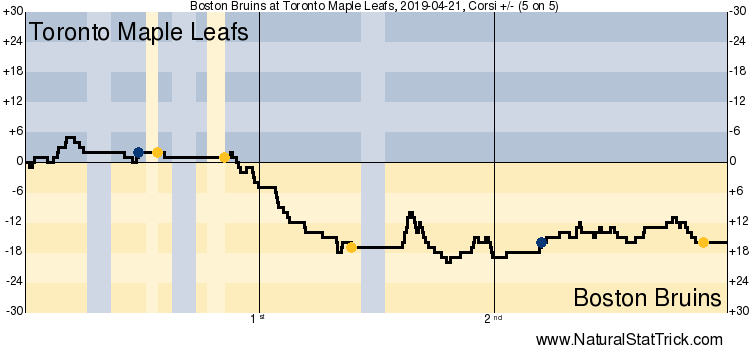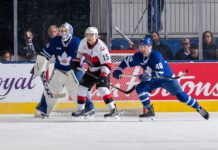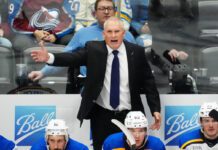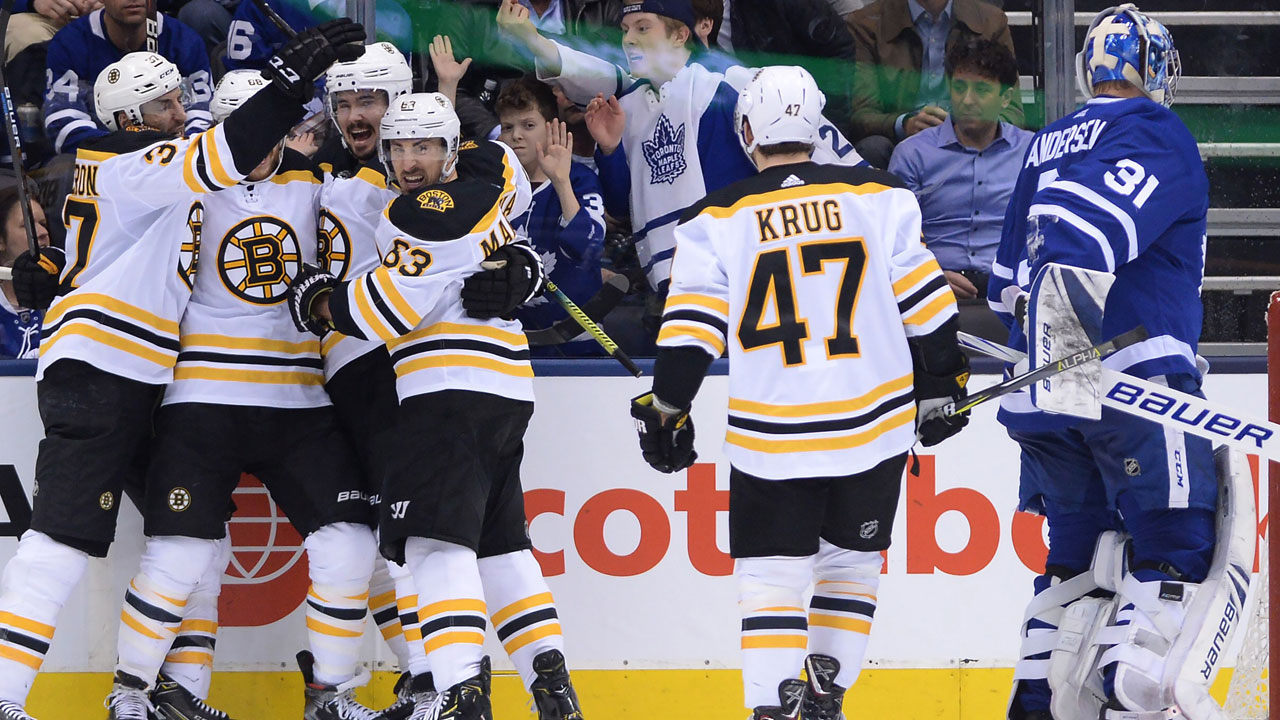We’re shipping up to Boston for another Game 7 after special teams cost the Toronto Maple Leafs a golden opportunity to close out the Bruins on home ice.
Your game in ten:
1. This game really took a turn after the first Leafs penalty 10 minutes in. The crowd was buzzing, the Leafs came out energetically, they had the ice tilting their way, and Boston didn’t have much of anything going on early. It all looked really good for the Leafs — while they did waste a power play, the breakouts were short and sharp, they were playing fast, and they looked dangerous on most of their 5v5 shifts. Morgan Rielly then scored the all-important first goal (the Leafs won the other two games in which they scored first in this series and have generally been good when playing with the lead). It felt like a continuation of Game 5.
As much as a penalty really shouldn’t turn a game if your penalty kill is functioning competently, the penalty by Tyler Ennis was a bad one to take nearly 200 feet from his own net. Extending a free arm like that is one of the easiest things for the officials to call. The Leafs basically never fully recovered in the middle 30 of this game after Boston turned momentum on the first power play.
2. Zach Hyman has been taking the vast majority of the Leafs shorthanded draws and has won just 23.8% of them (5 for 21) in the playoffs. It’s absolutely asking for it against one of the league’s best power plays when you start without the puck that often. Babcock is a big face-off guy, and yet they are totally ignoring that key detail in an area where face-offs matter a lot (PKs). This is really shooting yourself in the foot with the failure to adjust.
John Tavares has generally been solid in the circle in the series and has been holding his own versus Patrice Bergeron, so it doesn’t seem like a hard adjustment to start Tavares for draws and take him off if they win it and clear. It was bizarre to see the Leafs go right back to Hyman on the draws for the second first-period penalty kill after the Leafs lost four straight on the first one, including the one that led to the Brad Marchand goal (granted, that was a 50-50 draw where the Leafs’ winger in Mitch Marner didn’t take care of his guy in Marchand).
3. The other element is that the Leafs are very passive on the kill right now — they’re playing conservative and letting the Bruins work the puck around at will. It naturally looks like a unit lacking in confidence after what Boston has done to them in this series (7 for 16). On the Torey Krug goal, Pastrnak had plenty of space off the half all to rip a shot through and they were packed in tight as the rebound eluded them and Krug picked it up at the back post. There is a lot to sort out here — there have been far too many “that was too easy”‘s for Bruins power-play goals and the Leafs D and forwards are not on the same page at times — but to me it starts by getting someone in place who can actually win some draws so that they can send it down 200 feet a few times, get into their neutral zone setup, maybe deny a few entries, and see if they can get some momentum/confidence back in their kill that way.
4. Morgan Rielly was totally driving the bus for the Leafs in this game — the +31 Corsi relative to his teammates is an eye-popping statistic as to how much he was stirring the drink in this game. He scored, put six shots on net, was aggressive and intelligent jumping up into the play, pinched in for give-and-gos off the point, drove the play with his legs all game, played physical, negated a potential breakaway with a diving defensive effort on Jake DeBrusk, and generally just led the team throughout the game while playing over 25 minutes in ice time. He might’ve been a little gassed by the end, though — he threw a treacherous pizza directly in front of his own net that David Pastrnak really should’ve buried with a couple of minutes left and he was beaten on the Brad Marchand empty netter. Hard to criticize him there after throwing the team on his back for much of the night, though. It was a Norris Trophy-nomination-worthy performance up to that point.
Rielly gets another chance, this time denied by Rask. #LeafsForever pic.twitter.com/MyrH59paGh
— Maple Leafs Hotstove (@LeafsNews) April 21, 2019
Rielly with great patience gets a great chance that's blocked. #LeafsForever pic.twitter.com/fpgsEWSeIL
— Maple Leafs Hotstove (@LeafsNews) April 21, 2019
Morgan Rielly is a 200-foot player. Exhibit A: #LeafsForever pic.twitter.com/iesJfrHhIf
— Maple Leafs Hotstove (@LeafsNews) April 21, 2019
And the Leafs strike first. Rielly blast a great feed from Nylander. 1-0 Leafs. #LeafsForever pic.twitter.com/SzJVyugnzy
— Maple Leafs Hotstove (@LeafsNews) April 21, 2019
5. The other two really going among the Leafs best player group were Frederik Andersen — who was the only reason the Leafs were within striking distance and in a position to push for a tie late — as well as Auston Matthews. John Tavares and Mitch Marner were the stars of the show early in the series but need to find a way to impact the game offensively again in Game 7. It’s one thing to say a 5v5 saw-off is the best you can hope for against the Bergeron line, but Bruce Cassidy has split up their weapons over two units with Pastrnak moving down a line, and that’s now just one shot on goal and a -4 from Marner in his last three games.
6. The Leafs power play issues needs an article on its own given its under-performance relative to the skill on the units for the majority of the year and now the playoffs … but it seems notable that Auston Matthews has three goals from the right side of the ice in this series. Morgan Rielly also made this interesting comment after the game:
“They do a good job of taking away the two guys on the wing, Mats & Mitchy, which is probably what I would do too. So, they leave the shot open so it’s important that I get those through & we bang away at rebounds …”
It’s clear that the book is to close off the Leafs’ half walls, jam the middle, and give them the up-high stuff because Rielly’s shot — as much as he’s been really effective at getting it through this year for productive tips and rebounds — is not worrying anyone as its own threat. It changes the dynamic considerably if they make that switch to Matthews on his one-time side; if Rielly can take his space and force the Bruins to close on him a little bit before slipping it over for a quick one-timer option with Matthews, that opens up your best shooter versus needing Matthews to handle the puck with no time and space on his strong side. It’s gotten really stale and predictable.
7. What a frustrating sequence prior to the Brad Marchand 4-2 empty-net goal. The goalie pull without recovering the puck and setting the offensive zone yet was odd, and there was also just a total lack of urgency from the Leafs outside of Andreas Johnsson, who was outmanned in a battle down low after chipping it in. Just really poor execution and organization from the coaching staff and players there.
8. Staggering numbers with the ice time in the final five minutes.
F TOI in the final 5 mins of the 3rd period:
Matthews 3:15
Marleau 2:57
Tavares 2:44
Marner 2:34
Nylander 2:24
Johnsson 1:45
Brown 0:50
Kapanen 0:40
Hyman 0:34No 4th line shifts.
Just how we would all draw it up!
— Stephen Burtch (@SteveBurtch) April 21, 2019
Nazem Kadri is this team’s next best forward outside of the big four and that plays a bit of a role here, but at this point, I’d argue any forward except Connor Brown and Frederik Gauthier are better options than Patrick Marleau when pushing for a goal in the dying minutes. It’s really hard to justify your eighth or ninth-best forward, who is ice-cold offensively to boot, seeing those kinds of minutes in those situations.
9. That second period from Boston was the kind of hockey I’m sure the Bruins coaching staff will be holding up as the model of what they’ve been trying to accomplish (largely unsuccessfully) in this series at 5v5. That was really the first time this series outside of a brief spell in the second period of Game 1 and parts of Game 2 that Boston actually slowed the game down, tilted the ice heavily, and got on top of the Leafs with a lot of cycle time for a solid 10-15 minutes or so. The Leafs, for their part, were really, really sloppy — suddenly unable to execute on tape-to-tape passes or even handle a puck at times (Tavares, Marner, Nylander were really fighting it at points). The Leafs seemed to be rattled once a few things broke against them, but Boston, to their credit, played some fantastic hockey in the middle 30 portion of the game, took advantage of their opportunities (have done a good job of that all series, particularly on the power play), and staved off elimination like the experienced and talented team they are.
10. Turns out desperate, veteran 107-point teams don’t go quietly into the night. This was a lesson for the Leafs and technically not something this group has experienced at any point in their first two trips to the playoffs — closing out a good team, that is — because they trailed in each series. Game 7 in Boston is something they have experienced now, though, and the coaching staff and players alike need to step up if they’re going to finally exorcise the demons inside the house of horrors. The positive take is that both teams have responded to losses with wins each time and home-ice advantage hasn’t been a significant factor in the series as of yet. But Game 7s, as we all know, are often their own animal.
Feels as if a Leafs – Bruins Game 7 was always meant to be. Like, from the very beginning of the season.
— Anthony Petrielli (@APetrielli) April 21, 2019
Game Flow: 5v5 Shot Attempts


































![New Leaf Anthony Stolarz on the opportunity in Toronto: “In Florida, I knew my role as a backup… Now, [Joseph Woll] and I are competing for starts… As a goalie, that’s all you can ask for” Anthony Stolarz, Stanley Cup win, now Maple Leaf](https://mapleleafshotstove.com/wp-content/uploads/2024/07/anthony-stolarz-sc-100x70.jpg)
